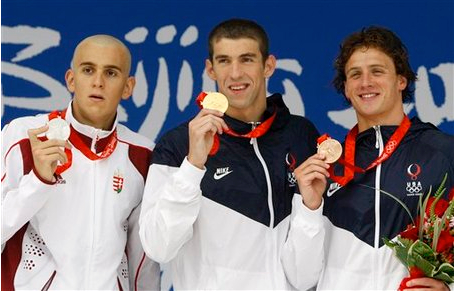In a study of the Barcelona Olympics, researchers concluded that winners of the bronze medal tended to be happier than the athletes who got the silver.
Please look at the expressions (below) of the Olympic medal winners for the 200-meter individual medley at Beijing in 2008. Michael Phelps (center) won the gold. Doesn’t the silver medalist on the left look rather glum?

Where are we going? Even when an accomplishment is an objective fact, our perceptions of its value can vary.
According to the Barcelona Olympics paper, silver and bronze medalists feel differently because of their reference points. Focusing on what could have been, the silver medalist thinks, “if only…” and “why didn’t I just…” By contrast, bronze winners tend to take pride in having won a medal and topping so many other competitors. The silver medalist looks “upward” to the gold winner as his or her reference point while the bronze looks “downward” to all those who won nothing.
Our bottom line: Reference points take us to a phenomenon that behavioral economists call framing. The context within which we assess an accomplishment–its frame–is created by our reference points. At work we will be unhappy with a 5% raise when an associate gets 7%. If our stock portfolio plunges, we don’t feel so bad if the S&P declined even more.
How might framing affect our emotions during a World Cup 2014 game? Please let us know in a comment.
How Less Might Be More At the World Cup

Elaine Schwartz
Elaine Schwartz has spent her career sharing the interesting side of economics. At the Kent Place School in Summit New Jersey, she was honored with an Endowed Chair in Economics. Just published, her newest book, Degree in a Book: Economics (Arcturus 2023), gives readers a lighthearted look at what definitely is not “the dismal science.” She has also written and updated Econ 101 ½ (Avon Books/Harper Collins 1995) and Economics: Our American Economy (Addison Wesley 1994). In addition, Elaine has articles in the Encyclopedia of New Jersey (Rutgers University Press) and was a featured teacher in the Annenberg/CPB video project “The Economics Classroom.” Beyond the classroom, she has presented Econ 101 ½ talks and led workshops for the Foundation for Teaching Economics, the National Council on Economic Education and for the Concord Coalition. Online for more than a decade. econlife has had one million+ visits.




